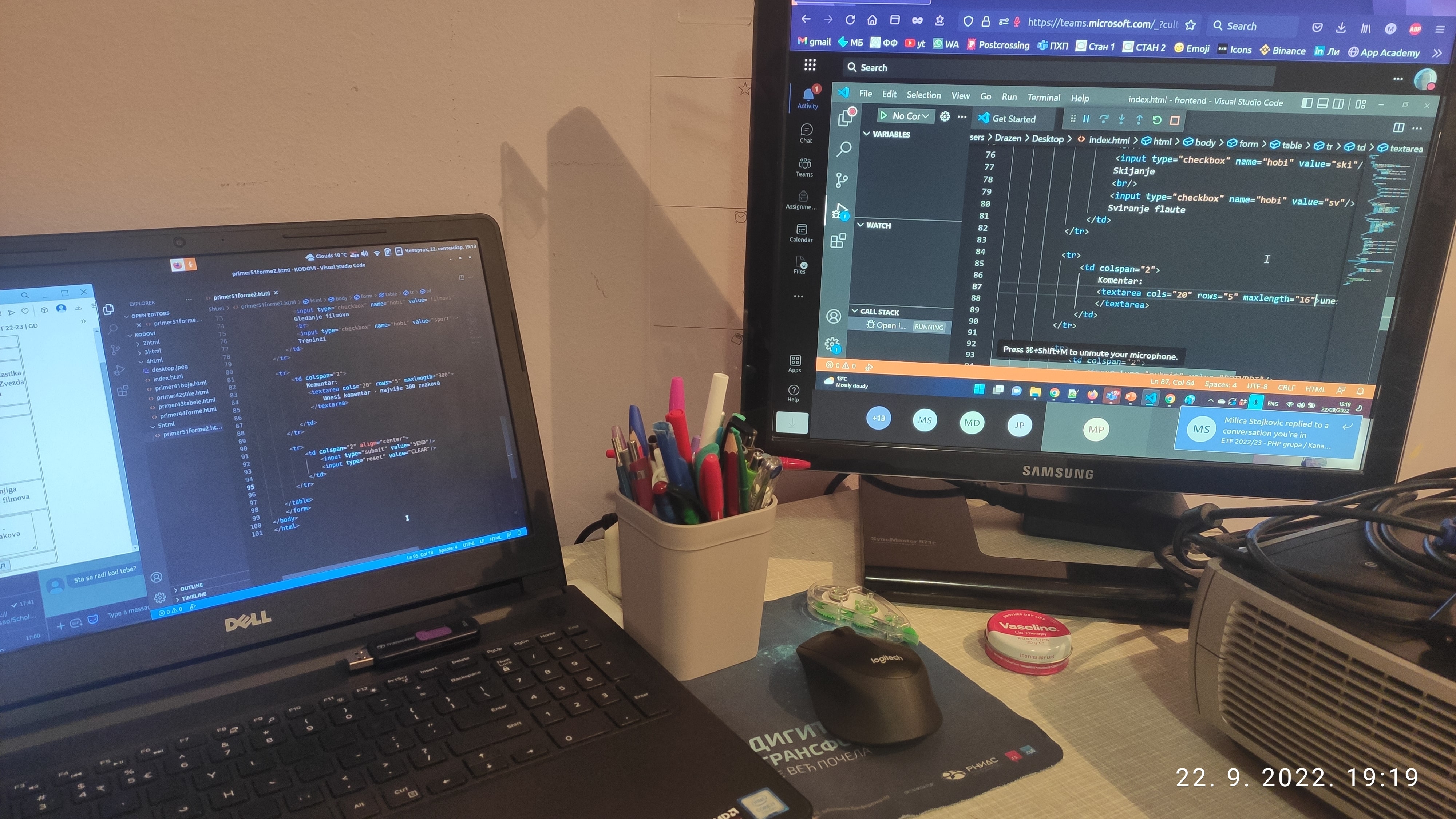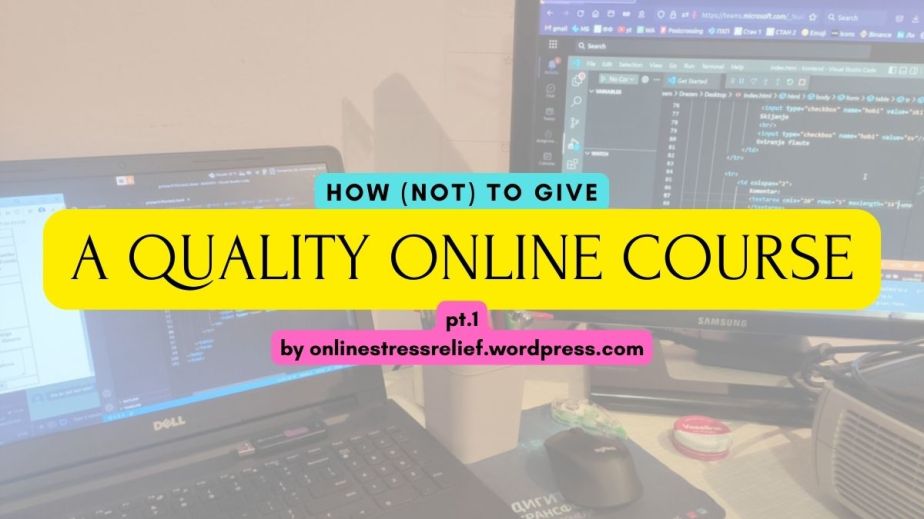I recently changed my job, replacing teaching English with software engineering. Knowing I studied in the field of social sciences, and with a significant work experience in the very same field, delving into an area diametrically opposite to it was not an easy feat – yet, I did it.
I did it by attending a state-organised one-year intensive course of learning the basics of programming.
Now I attend the same state programme, yet since I opted for a different programming language, I am a student at a different school. And, oh, boy, do I regret the decision! Here’s the story about it.
Why an online course, i.e. my educational background
As I already said, I studied English language and literature, which has inevitably led me to becoming an English teacher right afterwards. Since I hold both BA and MA degrees, my studies combined numerous courses in all language fields you could imagine. While just a small number of courses were optional, with the load of mandatory courses we covered: the English and the American history and culture, the complete British and American literature from the earliest days to contemporary authors, the basics of numerous linguistic directions, such as morphology, phonetics and phonology, grammar, syntax, semantics, pragmatics, as well as translation and teaching. Mind you, these were all mandatory for me even though I went for a translation track, thus giving me, a future English professional, the optimal breadth and depth of a language study with which I was equipped of performing a high number of prospective jobs.
Furthermore, I started working right after completing my MA degree, so exactly one month after defending my MA thesis I found myself in the classroom, surrounded by middle schoolers. I even received the extra role of being a head teacher to 12-year-olds– at 25! – so together with learning how to teach in real life I immediately started learning all about the school paperwork and documentation. Even though theoretically and legally I shouldn’t have been responsible for grading pupils at that time, I so was as well. I suppose the circumstances dictated such an approach, as the school at the time did not have any qualified English teachers who could have acted as a mentor and introduce me to the secrets of the profession, but on the other hand this was somewhat a better option for me as it allowed me a complete freedom in literally everything, while for the things I needed help – I simply learnt by copying the good models from other colleagues.
To cut the long story short, over the course of the last 9 years, I taught at 12 schools, and had up to 2500 pupils altogether. The schools were primary, middle and high schools, with the age of pupils ranging from 7 to 19; in big cities and in remote villages; they were privately-owned and public, both technically equipped and completely rundown and poor. I also taught online lessons at the point when everyone was forced to move their physical classrooms to the ether of Google Classrooms, Moodles, Zooms, Insta lives, Google meets, and what nots. The amount of extra materials I made, the number of tests I made from scratch, or adapted from ready-made tests, the number of gamified learning practice tests and lessons, significantly exceeds someone’s 40-year career.
Mind you, I was not a good teacher. To this day, I believe I was not a good teacher according to the modern standards, as I was shaped by numerous old-school teachers and professors who were just a whole different level, and I wish we had more of them left among us. I was dedicated, I felt responsible when my pupils failed, I was organized, I invested a lot of time, energy, nerves, and thought, into every lesson I held, and along the way I realized I actually and genuinely liked teaching.
But, at the same time, I decided it was time for me to move on, as the job I was doing was no longer sufficient to cover my basic expenses: the roof over my head and the food to live by, let alone my sports activities, gas for my car, seldom shopping needs (which, lately, mostly meant some specific low-quality sport gear, or some adult-like formal attire), let alone any savings. It became too stressful, too demanding, too underpaid, and it simply started affecting my psyche so badly that I was dreading the very thought of going back.
Equipped with the knowledge I was systematically working on during the last year, and thanks to my persistence and a mad determination to not return to school, I succeeded in landing a desired software developer position at a big international company, which was all I wanted at the time.

Some time prior to all that, before the end of the school year, I again applied for the state programme I attended last year, not knowing what the future holds and, again, to cut the long story short, I got accepted to a new programme. The beginning of my new job and of the new course coincided at almost the same day, and even though there was a possibility it might be too much for me, I went for both, and now, almost two and a half months later, I am starting to regret the decision of the new course. There are just too many issues with it, the most important ones being a huge hindrance for my learning prospects in the future.
All in all, I believe I have enough experience under my belt to summarize the problems with the new course, together with possible solutions to them – as if only there were ears willing to listen to them.
What makes an online course a good one, or how to distinguish a course that is worth your time from a waste of time
#1: Ex cathedra teaching
Different subjects require different teaching approaches. While in some theoretical ones it is completely legitimate to have a teacher talking for hours, that is just how it is; and there are no better ways to transfer such knowledge. In others, such as maths, the majority of work is just plain drilling – practice, practice, practice, while the theory of any module could be summarized in a matter of a few minutes. The next group of subjects, on the other hand, require constant interaction of the teacher and the pupils, where the teacher is there to provide the theoretical framework to inspire students to fruitful discussions or constant work.
While my last-year course was mainly delivered relying on the interactive method, my current PROGRAMMING course completely relies on ex-cathedra teaching style, whereby a teacher comes to the lesson, tells us the topic, and starts doing the tasks – HIMSELF, with us only copying the code, only asking questions if we don’t make it in time or if something is not working.
Coming from a completely different niche, this is the teaching style which definitely does not work for me as a student, as it does not include explaining the underlying concepts nor understanding what we are doing, just doing a specific task with a specific set of tools, so when faced with a different task I will perfectly NOT be able to do it.
This is even more striking when I think about my last-year course, where we would be covering theory in one lesson, with copying the teacher’s code, and in the next lesson doing the tasks ourselves, based on the previous lesson. Yes, the tasks were relatively easy, and fully sequential, thus connected to one another, but at the same time they enabled us to complete the codes with success if we remembered the previous lesson.
Such teaching style keeps the learners alert at all times, grabbing their attention, and allows for the personal feeling of feasibility and success, which further feed the internal motivation to keep going.
On the other hand, the ex cathedra teaching in PROGRAMMING makes me fell bored, and allows me to constantly text and simply buzz off, feeling those 3 and a half hours like an endless tirade I have to stand three times a week for 10 months.
#2: New teacher for every lesson
The most unnerving aspect of this new course are teachers which are on a roll for EVERY lesson! So far we had 30 lessons with 10 teachers! Okay, now you may think, okay, maybe they are specialised in a specific lesson, or they simply can’t make it, or whatever, but NO! This is how they teach at their school, and even though previous groups also disliked the method, and even though we made a complaint about it, they are simply not taking it into consideration to make any changes, no matter how hard we complain.
For a teacher of a social science study, I find this teaching practice abhorring! As a student in such a setting, I feel insecure, anxious and unsupported, when I have a new teacher every day. I cannot establish a connection with any teacher, nor is there a possibility to deliver rapport on beside of the teacher. I cannot even get to like the teacher, which, let’s face it, is a significant part of my willingness to keep returning to the lessons. Each of them has a different tone, different sentence structure, different teaching style, different explanations, different preferences, so having to deal with a new set of all this together with attempting to learn something as challenging as programming just makes me go nuts, schizophrenic even!
On the other hand, last year we covered five modules: fundamentals of programming, object-oriented programming (10 lessons each), databases (8 lessons), backend in Java (21 lesson) and frontend (21 lesson). With the exception of the last one, each of these modules was held by a different teacher. The last one was divided into two sections, where one person taught us the basics of HTML and CSS, and the other one was in charge of JavaScript. Such concept not only resembles a regular school, but also allows us a mental break between the modules, each of which ends with a test of a kind, thus also allowing for a revision time, where we see how we stand and what we are missing.
Again, as a school teacher, I know how bad it is for pupils having to get used to a new teacher of the same subject every year, so no matter how hard I think about this, I cannot get a grip of the idea behind an approach where each lesson is, for no reason, presented by a different teacher. If they cannot organize themselves to deliver a 10-month course other than hiring 20 people to interchangeably deliver 60 lessons, maybe they shouldn’t be giving such a course in the first place!
#3: Inadequate materials
The quality of the courses in this state programme, I suppose, also lies in the fact that they are held by university teachers in various schools, giving us an opportunity to see what it would feel like if we were students there for real.
However, what I have seen so far in the last two months are claims that we are presented the same material as their regular students, which is a horrible practice for numerous reasons, and which only tells us that there is one-size-fits-all approach, and if we are not happy with it there is not much we can do about it.
Can you imagine explaining one and the same concept, say, genetic inheritance of features, to a teenager at high school who only studies that as a single biology lesson, and to a biology student who has an entire one-semester course about it?
First and foremost, my entrance exam for the course was significantly different than the entrance exam those students take and successfully pass, giving room for different abilities and experience to come to the foreground. Most such students have competed in maths, physics, science, and have just graduated from high schools where they were preparing for their studies. I, on the other hand, struggled with almost all STEM courses in high school. They excel in maths and science just the same way as I excel in linguistics, so I believe it is quite reasonable they and I are not the same, thus that we need different approach in order to learn something new.

Secondly, I am not 19, nor 20, nor 25, nor am I just a student whose sole concern is to pass the exams and go partying afterwards to celebrate. With a full-time 9-to-5 job, I cannot afford a lot of free time to explore the depths of the Internet to find a solution to a coding problem I might experience or for something I may not have understood in class. When I do have that free time, I am attending that very lesson!
Thirdly, when we think of students, we could say that they as a group are quite homogeneous in comparison to us who attend courses. They are all pretty much the same age, going through the same life milestones, etc. We, on the other hand, differ up to 3 decades in age, and we differ in jobs, in educational background, in relationships and family status (a single 25-yo gal living with her parents and a 47-yo mother of three definitely have no same approach to life, I can tell you that), and we most strikingly differ in needs in relation to the course. While some of us need it as a career change, other may be there just to get a taste of it. In fact, we seem to be the most prototypical example of a mixed-ability group. So, correct me if I am wrong, but how can you teach such a diverse group relying on the same teaching methodologies and materials you use for a completely different group?!
And, last but not least, my last year course was the embodiment of materials adapted to the lowest level group, i.e. absolute beginners in programming. They openly told us that we were given more than their students at uni, and that the material was completely different. Their teaching covertly showed us that they were aware we were completely new to the matter, and they broke it all down to the basics, which was the right approach for the given circumstances. That was why the majority of the group was able to understand the most and not to give up, and regardless of our mutual differences allowed us to truly learn and understand. We covered a lot of theory, meaning we were instilled with the underlying concepts, while at the same time we were given enough room to practice on our own, giving us a sense of achievement and satisfaction and feasibility, empowering us to dig deeper. This new course has none of that, and I can only say that is where the organizers failed so infamously.
This has been quite a verbose half of this piece of writing. If you’ve come this far, I assure you the next part is just as interesting as this one. So, click here to keep reading about:
- 4: Inexperienced teachers
- 5: Cameras off
- 6: Incoherent groups
- 7: Meaningless homework
- 8: Teaching methodologies
- 9: Lack of inspiration
Or, feel free to browse other categories, such as random, or travelling. Why not visit the blog altogether?


One thought on “How (not) to give a quality online course, pt.1”